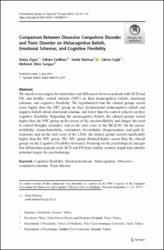Comparison between obsessive compulsive disorder and panic disorder on metacognitive beliefs, emotional schemas, and cognitive flexibility
Citation
Oguz, G., Celikbas, Z., Batmaz, S., Cagli, S., Sungur, M. Z., & SpringerLink (Online service). (2019). Comparison Between Obsessive Compulsive Disorder and Panic Disorder on Metacognitive Beliefs, Emotional Schemas, and Cognitive Flexibility. (International journal of cognitive therapy.), 12 (3), p. 157-178. DOI: https://doi.org/10.1007/s41811-019-00047-5Abstract
We aimed to investigate the similarities and differences between patients with OCD and PD, and healthy control subjects (NPC) on their metacognitive beliefs, emotional schemas, and cognitive flexibility. We hypothesized that the clinical groups would score higher than the NPC group on their dysfunctional metacognitive beliefs and negative beliefs about emotional schemas, and lower than the control subjects on their cognitive flexibility. Regarding the metacognitive beliefs, the clinical groups scored higher than the NPC group on the scores of the uncontrollability and danger, the need to control thoughts subscales, and on the total score of the MCQ-30. On the uncontrollability, comprehensibility, rumination, dissimilarity, dangerousness, and guilt dimensions, and on the total score of the LESS, the clinical groups scored significantly higher than the NPC group. The NPC group obtained higher scores than the clinical groups on the Cognitive Flexibility Inventory. Focusing on the psychological concepts that differentiate patients with OCD and PD from healthy controls might help identify potential targets for psychotherapy.


















